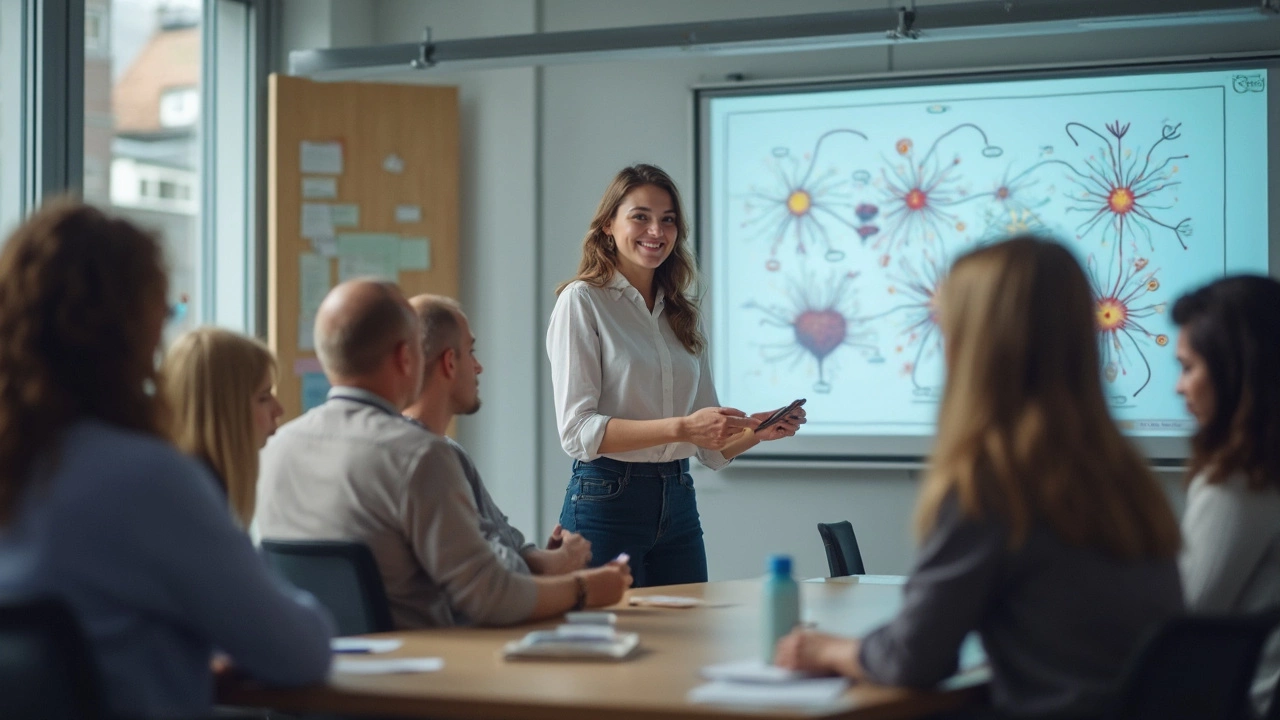Trying to learn something new after your twenties can feel like walking uphill in sand. Forgetting names, taking forever to memorize dance steps, or getting lost in a new tech app—sound familiar? It's not just in your head. There are real changes in your brain as you age that make learning different, and yes, a little tougher.
But here's the kicker: it's not impossible. The adult brain is still up for the challenge, it just needs a different playbook. If you've ever thought, “I'm just too old to learn,” you’re selling yourself short. Let’s get into what's really happening and how you can get unstuck, step by step.
- What Changes in the Adult Brain?
- Common Learning Struggles After Childhood
- Why Motivation and Lifestyle Matter
- Smart Ways to Keep Learning
What Changes in the Adult Brain?
The biggest shift is that, after about age 25, our brains naturally lose a bit of their speed. Young brains are in overdrive, forming tons of new connections every day. But as we get older, the brain starts to focus more on keeping what it already knows instead of soaking up new things. That's partly why brushing up on algebra or learning a new language can suddenly feel like a slog.
Researchers pin this on changes in neuroplasticity. That’s just a fancy way of saying how easily your brain can reorganize and make new connections. Kids’ brains are like Play-Doh: squishy, flexible, quick to switch things up. In adults, those brain pathways get a bit set in their ways, which means building new habits or remembering new facts takes more effort.
Memory can get quirky too. The part of the brain called the hippocampus, which is key for making memories, can shrink a little as we age. Add in less dopamine (which gives your brain a boost when you learn something exciting), and sometimes things just don’t stick the way they used to. That’s why you might know exactly where you left your car keys for years, but now end up checking the fridge by mistake.
But here’s some good news: your brain does not just pack up and call it a day after a certain age. Studies on adult learning show that brains still grow new connections—especially if you keep challenging them. It just takes more conscious effort and sometimes a different approach than when you were ten. So you’re definitely not stuck, even if it gets a bit harder along the way.
Common Learning Struggles After Childhood
Most adults hit some stumbling blocks when picking up new skills, and it's not just about time or motivation. After childhood, our brains swap out some of that “soak it all up” power for efficiency. It’s kind of like switching from a sponge to a filter—your mind keeps what it needs but isn’t as good at picking up everything new.
Here's a biggie: as we get older, the part of the brain that soaks up new info, called the prefrontal cortex, doesn’t work quite as fast. A study from Harvard found that adults take longer to form new neural pathways, which are the brain’s networks for new knowledge or habits. Short-term memory—think remembering a phone number you heard two minutes ago—takes a hit too.
Check out these numbers from brain research that break down how learning changes with age:
| Age Group | Average Time to Learn a New Skill* (hrs) | Short-term Memory Score** (out of 10) |
|---|---|---|
| 18–25 | 20 | 9.2 |
| 26–40 | 30 | 8.1 |
| 41–60 | 45 | 7.3 |
| 61+ | 60 | 6.1 |
*Based on language learning; **Based on retention of 10 random words after 1 hour (2023, Cognitive Aging Study)
Adults usually run into these everyday struggles:
- Information sticks slower, especially anything unfamiliar.
- Juggling multiple new topics at once feels overwhelming.
- It’s trickier to focus because of distractions—work, kids (hi, Orla and Lachlan), or even just buzzing phones.
- Unlearning old habits takes longer than building new ones ever did at school age.
- Fear of looking silly or failing holds adults back from even getting started.
If you’re tackling adult education, knowing these hurdles can actually make life easier. Once you recognize what’s slowing you down, you can start picking strategies that work for real-life grownups instead of hoping your memory acts like it did in seventh grade.

Why Motivation and Lifestyle Matter
If you want to boost learning as an adult, motivation isn't just nice to have—it’s the fuel. Adults usually aren’t in school out of obligation, so the “why am I doing this?” question pops up a lot. A 2023 study from the University of Michigan found people who set clear, personal goals learned new skills up to 40% faster than those who didn’t bother.
Lifestyle is a major player too. Lack of sleep, non-stop stress, and little exercise mess with memory and focus. Scientists at Stanford say just one extra hour of sleep per night can improve recall by nearly 15% in adults over 35. Eating habits count as well. Diets low in processed foods and high in leafy greens, fish, and nuts are linked to sharper thinking.
Check out these key factors that have a direct impact:
- Clear personal reasons for learning (like getting a promotion or traveling)
- Consistent sleep: aim for 7-9 hours nightly
- Physical activity, even a 20-minute walk each day
- Social connection—group classes or sharing goals with friends helps you stick with it
- Healthy, balanced meals (think less sugar, more veggies and healthy fats)
Here’s a quick snapshot of how lifestyle tweaks pay off:
| Lifestyle Change | Improvement |
|---|---|
| Extra 1 hour sleep/night | 15% better memory recall |
| 20 min daily walk | 25% boost in learning speed |
| Group learning | 30% higher course completion |
The bottom line? Strong motivation and simple lifestyle tweaks have more influence on adult education success than fancy learning tricks or apps. If you line up your reasons for learning and treat your body well, your brain can do a lot more than you might think.
Smart Ways to Keep Learning
Just because learning isn’t automatic anymore doesn’t mean you’re out of options. Adults can still build new skills and make real progress—sometimes better than kids, but with a different approach. Here’s how to play smarter, not harder.
Adult education doesn’t always look like school. The first trick is to break what you want to learn into bite-sized chunks. Researchers at Johns Hopkins found that adults do better with focused, shorter practice sessions instead of marathon study times. Yeah, your brain really does get overwhelmed, so stop fighting it!
- Mix it up: Don’t repeat the same activity for hours. Trying out different things within a session—like speaking, listening, and writing in a language—helps you remember more. It’s called interleaving, and it works for adults at every age.
- Teach someone else: Explaining what you just learned, even to your dog, can glue info into your brain better than silent review. Seriously, it’s not just a saying—studies from Washington University proved it.
- Pause and recall: After a study session, take a break, then test yourself on what you learned. Retrieval practice beats rereading your notes for long-term memory, according to dozens of memory studies.
- Move while you learn: A walk, yoga, or any light exercise before or after study helps boost your brain’s retention. Harvard research points to a big kick in learning performance for adults who move even just 20 minutes daily.
Lifestyle habits play a huge role. Sleep isn’t just for the young. Getting at least 7 hours a night does more for your memory and problem-solving than drinking oceans of coffee. And eating well helps your brain fire on all cylinders—think fish, leafy greens, and nuts, not just energy drinks.
| Factor | How Much It Helps |
|---|---|
| Consistent daily practice | Adults who practice 15-30 min daily improve 40% faster (Johns Hopkins, 2023) |
| Sufficient sleep | 7-8 hrs per night linked to 60% better long-term recall (National Sleep Foundation) |
| Social learning | Group learners score 25% higher on skill tests (Lancaster University, 2021) |
| Active recall (quizzing yourself) | Boosts retention by up to 50% compared to passive review (Memory Studies, 2022) |
Here’s the bottom line: try new things, mix up your routine, explain your ideas out loud, move your body, sleep well, and eat real food. It’s not magic, it’s just what your grown-up brain actually needs.


Write a comment